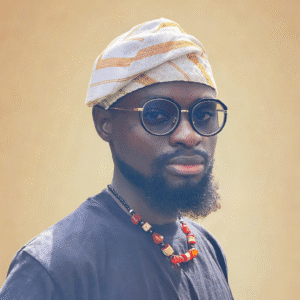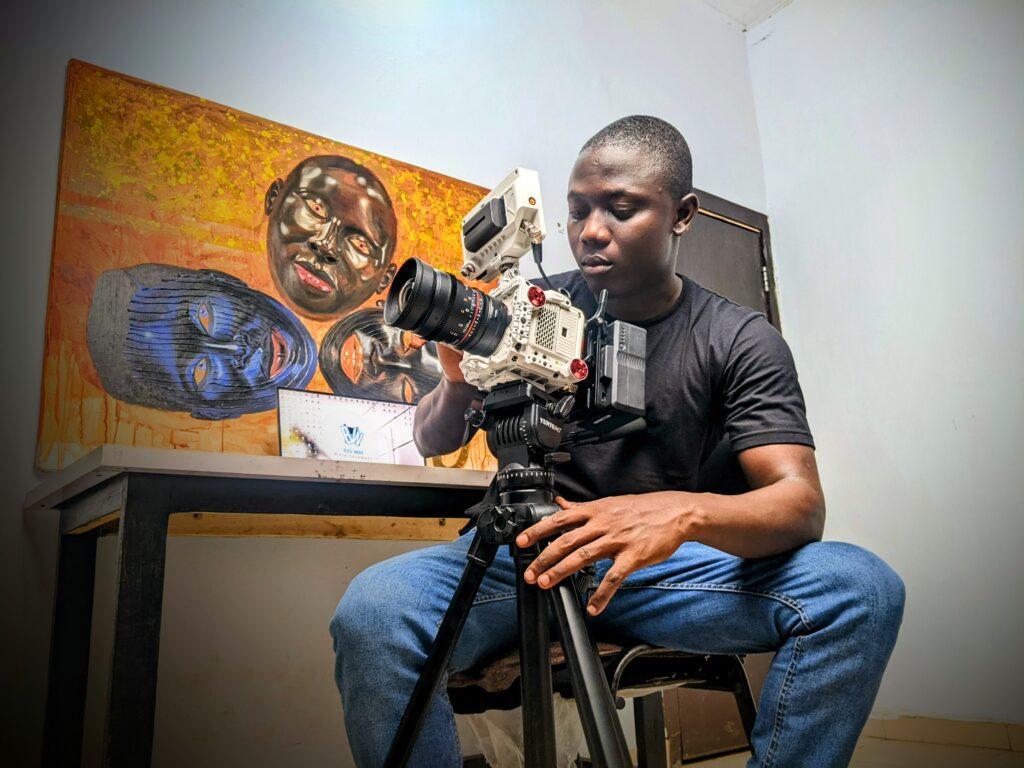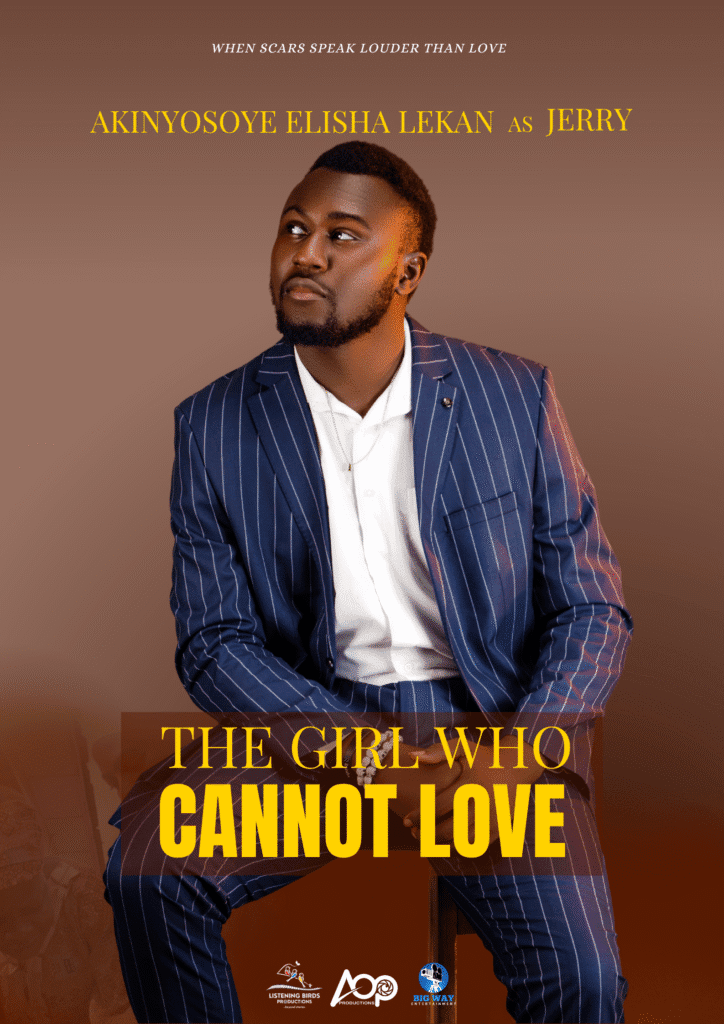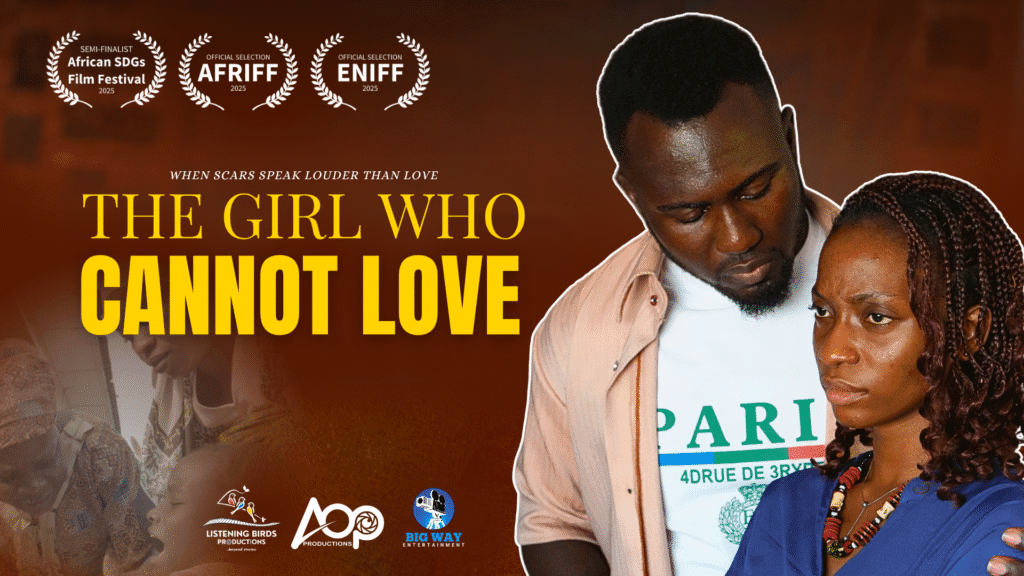The Story⚡
AFRIFF 2025 will spotlight Immanuel Táiyéwò Fáwọlé’s powerful short film, The Girl Who Cannot Love, a haunting exploration of trauma, healing, and the scars left by harmful traditions.
Tell Me More
Emerging Nigerian filmmaker, playwright, and novelist Immanuel Táiyéwò Fáwọlé has achieved a remarkable feat with the selection of his short film The Girl Who Cannot Love for screening at the 14th edition of the Africa International Film Festival (AFRIFF) — the continent’s largest and most prestigious film gathering.
Co-produced by Listening Birds Productions, AOP Productions, and Big Way Entertainment, The Girl Who Cannot Love is a deeply emotional and socially charged drama which tells the story of Ebunola, a reclusive artist whose painful past has numbed her capacity to love. Having survived the traumatic experience of breast ironing—a harmful cultural practice disguised as protection—Ebunola struggles to reclaim her sense of self and intimacy. When Jerry, a kind and persistent admirer, enters her life, she must decide whether to confront her trauma or continue living behind emotional walls.
Beyond its AFRIFF selection, The Girl Who Cannot Love has continued to gain recognition on the festival circuit. The film was a semi-finalist at the just-concluded African SDGs Film Festival and is also an official selection at the Eastern Nigeria International Film Festival (ENIFF), further establishing it as a powerful voice in advocacy-driven cinema.
“For me, storytelling has never been just about entertainment,” says Fáwọlé, the film’s writer and producer. “The Girl Who Cannot Love was born out of my conviction to use film as a voice for the voiceless and to shed light on an ancient cultural practice that has caused generations of women deep pain and trauma.”

Fáwọlé, who is currently a doctoral researcher in Theatre and Film Studies at Redeemer’s University, first encountered the concept of breast ironing during his master’s research. The film, he explains, is not merely an artistic expression but an advocacy tool, a means of sparking conversation and empathy around an underreported form of gender-based violence.
“It’s a spark, not a solution,” he adds. “But if it moves people to talk, to feel, and to act, then it’s doing what stories are meant to do.”
Directed by Oluwafemi Peter Atoyebi, the film brings together a small but passionate team united by their belief in storytelling as a catalyst for change. Atoyebi describes The Girl Who Cannot Love as “a short film everyone should see.”

“As soon as I read the script, I knew it was a story that needed to be told,” Atoyebi shares. “It would be better if the movie gets to parents around Africa before the callous advice of breast ironing gets to them. As a lover of educational and healthy content, I got connected to the script immediately.”
Cinematographer and editor Olaoye Popoola approached the film’s visuals with deliberate restraint and empathy. “After the writer/producer shared the idea with me, all I wanted to do was represent it as faithfully as possible—through camera angles and movement, cuts, and colour grading—to portray the emotions throughout the film so that every audience member can grasp the seriousness of the subject matter’s aftermath.”

For lead actress Sharon Alabi, who portrays Ebunola, the film was both a professional challenge and a personal awakening. Alabi, whose debut short Adunni won Best Short Film at AFRIFF 2024, tapped into her own mother-daughter experiences to embody the emotional complexities of her character.

“While I’ve never experienced what she went through, I drew from personal experiences, especially moments in my own mother-daughter relationship, to connect with her emotions,” she reflects. “I had to imagine what it’s like to be broken by tradition, to carry emotional scars, and to channel that into an authentic performance. It was both challenging and eye-opening.”
Opposite her is Akinyosoye Elisha Lekan as Jerry, whose character represents love’s persistence in the face of pain. “I’ve always wanted to play a lover boy and a hopeless romantic in a film,” Akinyosoye says with a smile, “I got to do that, although it didn’t go the usual way we would normally expect. The twist is what made it all the more interesting.”

The film’s haunting score, composed by Joy Karenate-Egbuson, anchors its emotional depth. For Joy, The Girl Who Cannot Love was both an artistic and emotional test.
“The music carries the emotional weight that the main character can’t always express,” she explains. “It reflects her shame, her fear, her longing and sometimes, her numbness. In a story like this where so much is unsaid, the score becomes the heartbeat.”

At its core, The Girl Who Cannot Love is not just a film. It’s a call to conscience. It urges viewers to confront the cultural and emotional realities of women who live with the invisible wounds of harmful traditions.
Fáwọlé hopes that the film’s AFRIFF selection will amplify its message and encourage meaningful dialogue.
“We made this film to humanise statistics,” he concludes. “Behind every number is a life, a memory, a wound, and perhaps, a chance for healing.”
With its official screening set to take place at AFRIFF 2025, The Girl Who Cannot Love stands as both a creative and humanitarian triumph, one that reaffirms cinema’s power to heal, question, and transform.
In Summary
With its AFRIFF 2025 screening, The Girl Who Cannot Love continues its journey as a bold work of advocacy-driven storytelling. By exposing the emotional aftermath of breast ironing, the film transforms private pain into public awareness and positions art as a vital force for empathy and social change.

Thanks for Reading.
Shockng.com covers the big creators and players in the African film/TV industry and how they do business.
Let’s be friends on Instagram @Shockafrica



